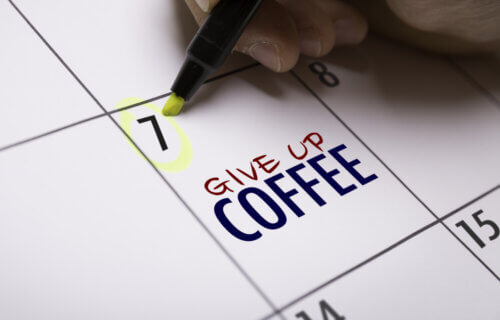Caffeine is the most consumed psychoactive compound in the world. Even if you don’t drink coffee or tea, you probably still regularly consume caffeine since it’s found in everything from soft drinks and cold remedies to decaf coffee and chocolate.
When caffeine is consumed, it’s rapidly absorbed by the body – reaching peak effects within two hours (though it may take up to nine hours to leave your body). It’s also water and fat-soluble, so it gets into all body tissues, which explains why caffeine can affect many different parts of the body.
It’s recommended that adults consume no more than 400mg of caffeine a day (approximately four cups of coffee). More than this may lead to muscle tremors, nausea, headaches, pounding heart and even death (in extreme cases).
But even people who only consume a couple cups of coffee or tea daily may feel it still has adverse effects – such as irritability, difficulty falling asleep and feeling jittery. This is why a growing number of people are deciding to give up caffeine.
If you’re thinking about giving up caffeine and are wondering what benefits it may have, here’s what the research says:
Brain function
Caffeine withdrawal can cause headaches, fatigue and tiredness. This is because the body develops a tolerance to caffeine.
Caffeine binds to a receptor in the brain used by adenosine. The binding of caffeine to these receptors causes the body to delay the onset of fatigue. But over time the brain cells produce more adenosine receptors to enable normal adenosine binding to happen.
So, when you stop consuming caffeine, there are excess adenosine receptors to bind to. This allows fatigue and tiredness to kick in as normal, with the person feeling more tired than before.
Headaches happens as a result of the absence of caffeine. In the head and neck, caffeine causes the blood vessels to narrow, reducing blood flow to the brain. When you stop drinking caffeine, after approximately 24 hours it causes the blood vessels to return to normal, causing an increase in blood flow to the brain and triggering headaches. They may last up to 9 days on average.
And because caffeine binds to adenosine receptors (which also modulate pain) quitting caffeine may temporarily increase your perception and sensitivity to pain because there’s more receptors available.

Caffeine really only affects sleep when consumed in the late afternoon and evenings. This is because caffeine delays the release of melatonin (a hormone which makes us tired) by 40 minutes. Caffeine also reduces the overall time you sleep and shortens the period of deep sleep.
This can increase your tiredness the next day, leading to cycle of using caffeine to wake you up but having trouble sleeping later on as a result. When you stop caffeine, you may find your sleep improves. Some evidence suggests improvements are seen in as little as 12 hours.
Caffeine has also been linked to increased anxiety and panic attacks – and not just in those with a pre-disposition to mental health issues. Reducing or eliminating caffeine may improve your mood. This may partly be because it improves sleep. Sleep deprivation can exacerbate anxiety and other mood disorders.
But the adenosine receptors that caffeine bind to are also involved in the modulation of other neurotransmitters that have a role in stress, happiness and fear.
Cardiovascular health
Reducing or eliminating caffeine might also cure heartburn and indigestion. Caffeine induces acid secretion in the stomach and weakens the oesophageal sphincter, which controls reflux of stomach contents up the oesophagus – triggering heartburn and indigestion.
Quitting caffeine may also lower your blood pressure and reduce your heart rate – although other studies have shown little change.
This is because if someone consumes caffeine daily for many years, their body adapts to the exposure – and it becomes the new norm with its stimulant effects on the nervous system, bowels and heart.
There also appears to be genetic component to caffeine tolerance and metabolism. This could mean some people are more affected by caffeine over others – though more research is needed on this link.
A brighter smile
Cutting out caffeine may improve the whiteness of your teeth – not because of caffeine directly, but because tea and coffee contain compounds including tannins that stain teeth.
Sugar in energy drinks can also cause damage to your teeth. Quitting may help protect them. Evidence also suggests caffeinated drinks may reduce the amount of saliva you produce, which normally protects our teeth from damage.
You may also find that you have an increased sensitivity to the taste of sweet food and drinks after quitting, as caffeine interferes with the tasting of sweet substances.

Going to the toilet less
Caffeine acts on the smooth muscle of the intestines, particularly in the colon, causing them to contract and trigger the urge to poop. Caffeine can also change the consistency of your poo – especially if you drink too much, as caffeine affects water absorption.
Reducing caffeine intake may cause a less frequent urge to poop – and the consistency of your stools may change.
Caffeine also acts as a mild diuretic, causing an increase in urine production. This is because caffeine binds the adenosine receptors in the kidney, which alters how sodium is exchanged, affecting water retention. There’s also evidence caffeine is a bladder irritant, which can cause a more frequent urge to urinate. Quitting caffeine may decrease your daily toilet visits.
Moderate consumption
As with many things, it’s about moderation.
But if you’re seriously considering removing caffeine from your diet, the best way to do so is gradually. Going “cold turkey” will bring on side effects such as headaches and tiredness which can last two to three weeks.
How severe and long-lasting these are depends on how much caffeine you’ve consumed per day and how long your habit has been going.
Article written by Adam Taylor, Professor and Director of the Clinical Anatomy Learning Centre, Lancaster University
This article is republished from The Conversation under a Creative Commons license. Read the original article.

Not one single study cited to back up these claims.
Excellent observation! There are many health benefits to caffeine consumption, including increasing the effectiveness of many OTC meds. Coffee, which is the number 1 source of caffeine consumption, also has additional beneficial health effects that lower inflammation and reduce insulin resistance. As with everything we consume, “the dose makes the poison”. Even drinking too much water can cause death. Everything in moderation, including caffeine.
Agree
Thank you, Ironbob… you beat me to it… 67 years old here, ex-Navy (that says it all)… coffee drinker from age 12… I’ve heard it all before… Coffee is bad for you, no wait, coffee is good for you, actually.. then again, it’s hard to say… but the author(s) get paid to write by the word, so this being a slow day and all, they decided to just regurgitate the same old stuff… if nothing comes up, I guess they’ll have to write an ‘article’ about the possibility of extra terrestrial life visiting earth and building the pyramids, while referencing Graham Hancock or Taylor Swift. (move over, Kardashian’s, there’s a new expert in town)… But yeah, I like my coffee black and strong… like my teenaged girlfriend… just sayin’
Only 67? OK, well, you let us know when you reach 100, OK? 😉
Gives me Leaky Butt Syndrome (LBS).
People who drink more coffee live longer than people who drink less or none. You know this article is really reaching when it includes (and even begins with) the negative aspects of caffeine withdrawal. Most studies show benefits of coffee drinking in terms of heart disease, liver disease, diabetes, longevity, and others. People who drink coffee actually tend to have healthier heart rhythms than those who don’t.
And how would you know any of this? You’re just repeating what you read and believe. And you want to believe it because you’re addicted.
Probably not. But even if that was true, I might not be the coffee or the caffeine. It could just be starting off the day and drinking more water, or something else, or not true at all.
I am eighty-seven years old. I drink coffee all day till I go to bed about ten or eleven. Sleep like a log. Maybe because of my U S Navy 24 year career. Also add a coffee liqueur KAHLUA from Mexico. Perhaps that’s why I have longevity. l drink Douwe Egbert coffee. It’s Dutch. The best.
Thanks Mr. Case (and thank you for your service…) Ex-Navy here, also (1973-1978, STG2)… I remember the Chief giving me grief because I had taken it upon myself to wash all the coffee cups in the Sonar Shack… He was livid, as his mug had been ‘seasoned’… all I can say is that after I cleaned it, you were probably able to get another shot of java juice in the there from all the space that was freed up… Same guy who shamed me for putting milk and sugar in my cuppa Joe… After that, I dropped the latte stuff and drank it straight at ‘small-engine-parts-cleaner’ 30 weight strength…cheers
Caffeine is much worse for your health than people understand or are willing to accept. Everyone’s jacked up on this garbage and if you state any facts about the unhealthy consequences of being addicted to this stimulant, people freak out……because they’re addicted to a drug they need daily in order to get going or get through the day. Yes, people love their coffee/the taste/etc but no one loves it at first unless it’s heavy on sugar and creamer. Acquired taste = needs time before the addiction takes hold. Having your circulatory system constantly taxed by this garbage is no good for anyone. And if you have anxiety or any type of mental problems, this crap ain’t helping.
I don’t know about love, but I never liked or drank coffee until I tried half a cup in my late 30s. I didn’t like it, but when it cooled off and got cold I started to like plain black coffee. That bitter taste appealled to me without all the sugar and fat. I don’t drink much coffee, and it has little effect on me – probably because I had my lifelong dose of daily caffeine in soft-drinks. I like it in the morning instead of hot water to get things going. I think there’s just too much snobbery trying to be built up around coffee, like wine for something that is not that good but does have some redeeming qualities but is a fact of life.
I doubt coffee is actually bad for anyone unless they overdo it.
I have been drinking 4-6 shots (ounces) of pure espresso, with nothing else mixed in except the occasional raw sugar packet or two, about 5 days a week for the past 23 years. Although it does establish a regular bathroom routine, and if I don’t snack and drink a glass of water within 3 hours of drinking it, it can cause irritability. Now I just incorporate this into my drinking routine. I’ve found that I think and work faster than 95% of all co-workers and management. I truly attribute this to my ability to succeed in many things I’ve accomplished in my life so far. The key here is to listen to your body; it will tell you when you need to adjust. I believe that having 1-2 days without it a week is beneficial in allowing your body to be comfortable without it. On the days I don’t drink it, I don’t have any noticeable side effects so far. If you are not drinking straight unadulterated coffee in close to its pure form, your overpaying and adding unnecessary additives and taking way longer to drink your energy.
Coffee addicts don’t want to admit their addiction. All studies are in the article hyperlinked. Coffee depletes iron and calcium, raises blood pressure, stains teeth and dehydrates. For every cup of coffee, 5 cups of water are needed. Switch to healthy herbal teas instead.
Personally, I quit caffeine and for the first time in my life, my Crohn’s is in full remission without medication. It may have benefits for some, but not all.
Decaf coffee is much improved these days. Peet’s has a good one. Tastes like caffeinated
I call BS on this article! Coffee has been known to have health benefits! I will never give up my coffee. Stupid study with NO back up data to verify these claims!
I call BS on this ‘study’! Caffeine has MANY benefits. I don’t know where they got their stats from, but there is no citations for where it came from. I will not give up my coffee. Who wants to live longer if you don’t enjoy your life?
Interesting Article, and Great Comments. Personally, I love coffee. My late evening thoughts turn invariably to the next mornings opportunity to drink that lovely smelling and great tasting freshly brewed cup.
I too have heard pros and cons of coffee vs tea for a while. Green Tea is supposed to be especially good for people to drink, but I find the taste offensive. Coffee helps me physically, with energy it seems. It also help me have my ‘daily constitution’ every day. (You figure it out, possibly a good side effect of affecting water absorption in the lower intestine). However, one side effect that may have affected me, that is not even mentioned in this article is that because of caffeine’s diuretic effect, the increased urination actually passes out much needed Calcium, and possibly resulting in Osteoporosis.
One possible Good side effect is Caffeine’s effect upon Migraine.